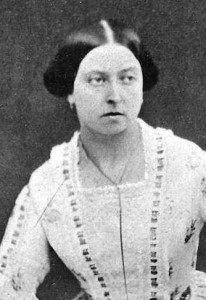Some of my patients have nausea and vomiting of pregnancy to such an extent that they have the severe symptoms of persistent vomiting, acute starvation (with ketones in the urine) and weight loss more than 5 per cent of their usual pre-pregnancy weight. We call this hyperemesis gravidarum but most people call it pregnancy morning sickness.
50% of pregnant women have nausea/vomiting in early pregnancy. It usually peaks at 9 weeks of gestation and in most cases will resolve by the end of the first trimester. It is associated with a decreased risk of spontaneous miscarriage.
A number of famous English women have suffered from it. Charlotte Bronte, the novelist and poet who wrote Jane Eyre, died at age 38 in the 4th month of her pregnancy of severe nausea and vomiting. Queen Victoria had 9 children, hated being pregnant, viewed breast-feeding with disgust and thought babies were ugly. She used marijuana to treat her morning sickness and also for childbirth pain. Kate Middleton, Duchess of Cambridge was hospitalized due to acute morning sickness. Her hospital stay was marred by invasion of privacy and suicide of one of her nurses.
In the 1950s and 1960s the most widely prescribed drug for treatment was Bendectin, a combination of Vitamin B6 and doxylamine, an antihistamine. It was a safe and effective treatment. The manufacturer, Merrill Dow Pharmaceuticals was bombarded with lawsuits that claimed it caused birth defects. Despite clear scientific evidence that Bendectin did not cause birth defects, lawyers prevailed over science and in 1982 the drug was withdrawn from the U.S. market to avoid further litigation expenses. A similar medication, Diclectin continued to be prescribed in Canada and its increased use there was found to result in a decrease in hospitalizations for this condition.
There are many theories on the cause of nausea and vomiting in pregnancy. It is thought to be an evolutionary protective response against eating foods that could be harmful to pregnancy. Some believe that it is due to increased levels of the pregnancy hormone HCG as it is more often found in twin and molar pregnancies that usually have increased HCG levels.
Treatment of morning sickness starts with the proper diet: small frequent meals with avoidance of spicy, fatty or odorous foods. Meals and snacks should be eaten slowly and in small amounts every 1 to 2 hours to avoid a full stomach. Women who feel nauseous should eat as soon as they feel hungry to avoid an empty stomach. A snack before getting out of bed in the morning can help. Pretzels, nuts, crackers, cereal and toast are often tolerated well. Cold, clear, carbonated or sour fluids in small amounts can help. Ginger ale, lemonade, and popsicles are good. Fluids are sometimes better if taken in with a straw.
Avoidance of triggers is useful. Some triggers include stuffy rooms, strong odors, heat, humidity, noise, visual and physical motion. Brushing teeth after a meal can be helpful. Supplements containing iron should be avoided as they can cause gastric upset. Taking prenatal vitamins before bed with a snack is better than taking them in the morning on an empty stomach.
Treatment of morning sickness may sometimes require medications. The FDA has recently approved a new formulation Diclegis for treatment of pregnant women experiencing nausea and vomiting. The medication is similar to Bendectin but has the advantage of a delayed-release tablet that works overnight. The usual dose is 2 tablets taken at bedtime. It’s two ingredients are both rated Category A for pregnancy, the safest FDA rating. Another medication that is widely used is Zofran (Ondansetron). It is rated Category B, also considered safe, and may have minor side effects of constipation, diarrhea, and fatigue.
In some patients these medications are not successful and hospitalization may be needed to give i.v. fluid therapy and improved nutrition through gastric tube feeding. There can be severe complications of nausea/vomiting of pregnancy including maternal depression, damage to the esophagus, and kidney damage. The fetus has an increased risk of low birth weight, but actually a decreased risk of miscarriage.
Morning Sickness of pregnancy is a common condition that interferes with normal daily life and can cause serious consequences. Having the optimal diet, avoiding triggers, and taking medications when needed usually results in the symptoms improving over time and a healthy baby at the end.


